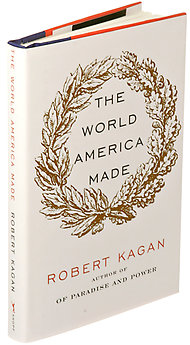February 14, 2012
Book of The Times
Review: Robert Kagan’s The World America Made
The World America Made- By Robert Kagan
reviewed by Michiko Kakutani@www.nytimes.com
 One thing Barack Obama and Mitt Romney seem to have in common these days is an appreciation for the neoconservative historian Robert Kagan (left).
One thing Barack Obama and Mitt Romney seem to have in common these days is an appreciation for the neoconservative historian Robert Kagan (left).
The Romney campaign has retained Mr. Kagan as a foreign-policy adviser, and according to news reports, President Obama has read and been influenced by a recent Kagan essay in The New Republic, which addresses “the myth of American decline” and underscores the importance of the United States’ maintaining its “global responsibilities.”
That essay was based on Mr. Kagan’s new book, “The World America Made,” a book that turns out to be a much more scattershot affair than the magazine article, a book that undermines its more potent arguments with fuzzy generalizations, debatable assertions and self-important declarations of the obvious (“It is premature for us to conclude, after ten thousand years of war, that a few decades and some technological innovations would change the nature of man and the nature of international relations.”)
The book does make a strong case for the notion that “the most important features of today’s world — the great spread of democracy, the prosperity, the prolonged great-power peace — have depended directly and indirectly on power and influence exercised by the United States,” and suggests that “when American power declines, the institutions and norms American power supports will decline too.”
Zbigniew Brzezinski, national security adviser to President Jimmy Carter, made similar points— with a lot more perspicuity — in his recent book, “Strategic Vision.”
Mr. Kagan also observes that the United States has never been omnipotent and astutely notes  that “in every single decade since the end of World War II Americans have worried about their declining influence and looked nervously as other powers seemed to be rising at their expense.”
that “in every single decade since the end of World War II Americans have worried about their declining influence and looked nervously as other powers seemed to be rising at their expense.”
He writes that pundits and foreign-policy makers have frequently bemoaned the foreign and domestic problems besetting the United States in the past, and points out that some recent commentators have been quick to flip-flop their assessments of America’s fortunes.
In 2004, he says, Fareed Zakaria described the United States as enjoying a “comprehensive uni-polarity” unlike anything seen since Rome, only to start writing, a mere four years later, about the “post-American world.”
But if some of Mr. Kagan’s efforts to place America’s current difficulties within a historical perspective (comparing, say, the challenges posed by China today to the threat of the Soviet Union during the cold war) can be instructive, others devolve into odd exercises in relativism or blatant rationalizations of current woes.
“Today the United States lacks the ability to have its way on many issues,” Mr. Kagan writes, “but this has not prevented it from enjoying just as much success, and suffering just as much failure, as in the past.”
He says that “for all the controversy, the United States has been more successful in Iraq than it was in Vietnam”: a decidedly low bar, it must be said, and a premature conclusion, given the ever evolving situation in Iraq. And he contends that “anyone who honestly recalls the 1970s, with Watergate, Vietnam, stagflation and the energy crisis, cannot really believe the present difficulties are unrivaled.”
Mr. Kagan’s sometimes shaky reasoning is combined with a failure to grapple convincingly with crucial problems facing America today, the very problems that observers who worry about American decline have cited as clear and present dangers, including political gridlock at home, falling education scores, lowered social mobility and most important, a ballooning deficit.
Mr. Kagan hops and skips around such issues, placing way more emphasis on the military aspects of power as a measure of a country’s health and global sway. For instance, of the burgeoning financial clout of China — which already holds more than $1 trillion in United States debt — Mr. Kagan asserts that it has implications for American power in the future “only insofar as the Chinese translate enough of their growing economic strength into military strength.”
Other assertions made by Mr. Kagan in these pages are similarly problematic. He declares that “great powers rarely decline suddenly” — the historian Niall Ferguson argued the exact opposite in his 2011 book “Civilization” — yet then proceeds to offer illustrations showing that “the decline of the British Empire” occurred over a few brief decades. It depends, the reader supposes, on how you define “suddenly.”
In another section of this book Mr. Kagan writes that the United States “enjoys a unique and unprecedented ability to gain international acceptance of its power.” The expectation of global support for American military intervention, he goes on, “is so great that in the Iraq war of 2003, Americans were shocked and disturbed when only 38 nations participated in either the invasion or the post-invasion occupation of Iraq. It was almost unbearable to find democratic allies like France and Germany withholding their endorsement.”
Such statements about the so-called coalition of the willing play down just how controversial the Iraq war (and the Bush administration’s policy of pre-emptive war) was among allies, and how negatively the invasion affected perceptions of the United States abroad.
A March 2004 Pew Global Attitudes poll, for instance, indicated that a year after the invasion of Iraq, United States favorability ratings had fallen to 58 percent in Britain, 38 percent in Germany, 30 percent in Turkey and 5 percent in Jordan. The same poll indicated that on the question of United States unilateralism, majorities in many countries felt the “U.S. considers others not much/not at all”: 61 percent in Britain, 69 percent in Germany and 77 percent in Jordan.
As for Americans’ own attitudes about the United States’ role abroad, Mr. Kagan tries to rebut the sort of isolationist thinking expressed by the Republican candidate Ron Paul and his supporters and more widespread concerns that with so many problems at home today, the United States should reassess its activist role on the global stage.
Mr. Kagan writes that Americans, despite certain misgivings, have, in fact, “developed a degree of satisfaction in their special role,” and as proof of this, he offers this not very persuasive anecdote: “During the seventh-inning stretch in every game at Yankee Stadium, the fans rise and offer ‘a moment of silent prayer for the men and women who are stationed around the globe’ for defending freedom and ‘our way of life.’ A tribute to those serving, yes, but with an unmistakable glint of pride in the nation’s role ‘around the globe.’ ”
Perhaps the most annoying symptoms of this book’s lapses in logic are related to Mr. Kagan’s penchant for setting up straw men adversaries he can easily knock down, or rebutting what he suggests are commonly held perceptions without explaining just how widespread such views might be or acknowledging the extent to which other thinkers, before him, have also contested the theories he is faulting.
In many cases Mr. Kagan seems to be referring to Francis Fukuyama’s frequently disputed thesis that liberal democracy will inevitably triumph around the world, or the psychologist Steven Pinker’s also contested argument that violence has fallen drastically over thousands of years, but he does not always identify them or their followers by name.
This volume is peppered with vague lines like “many believe that wars among the great powers are no longer possible,” or “it is a common perception today that the international free market system is simply a natural stage in the evolution of the global economy.”
Mr. Kagan mocks the Pollyanna-ish notion “that nations and people had become ‘socialized’ to love peace and hate war”; says “one often hears today that the United States need not worry about China and Russia”; and questions what he calls “the common view that there can be no wars for territory, because territory no longer matters in this digitalized age of economic interdependence.”
The condescending tone of large parts of this book, along with sometimes less than coherent reasoning, distracts attention from Mr. Kagan’s more original and useful ideas, and they make readers ponder the curious development that it happens to be this historian who’s recently found public favor in both the Obama and Romney camps.
” …. for all the controversy, the United States has been more successful in Iraq then in Vietnam ” … . – quoted by Michiko Kakutani.
Saddam Hussein , as a leader , was not of the same quality as was Ho Chih Minh. Also the Iraq’s as a whole , were not of the same quality as were the Vietnamese people. Hence , a walk over in Iraq and the hammering the Americans got in Vietnam is a very bad comparison.
The only thing I would agree with is the myth about the decline of America as a superpower.
The rest is patriotic gibberish.